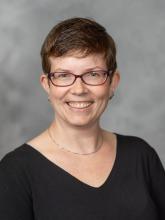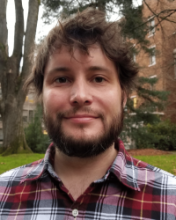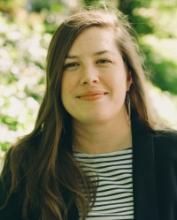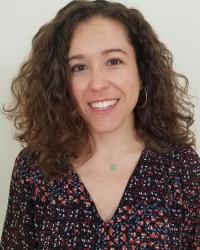
Dr. Kerschbaum’s first book, Toward a new Rhetoric of Difference, offers a theory of marking difference to understand how difference circulates and is taken up in everyday conversations and interactions. This theory is important for writing teachers and researchers who are interested in understanding how mundane, everyday interactions are consequential for broader cultural and institutional change. After its publication, Toward a New Rhetoric of Difference was awarded the “Advancement of Knowledge Award” from the Conference on College Composition and Communication.
Her co-edited collection, Negotiating Disability: Disclosure and Higher Education, was published by the University of Michigan Press in 2017. A collaboration with Laura T. Eisenman and James M. Jones, this book grew out of the 2013 Disability Disclosure in/and Higher Education conference sponsored by the University of Delaware’s Center for the Study of Diversity.
As a deaf academic, Stephanie frequently draws on her own experiences being the only signing deaf person in many of the environments she moves through to deepen her understanding of marking difference. She has been recognized locally and nationally for mentoring and faculty development work, most recently with the Lisa Ede Mentoring Award from the Coalition of Feminist Scholars in the History of Rhetoric and Composition. Dr. Kerschbaum is currently working on a book project titled Signs of Disability. Early parts of this project have been shared in the journals College English and enculturation.

Frank Macarthy held previous academic positions at Illinois State University, University of Pittsburgh, Duquesne University, and most recently, Jamestown Community College. Over the past eight years, he has taught a range of composition courses from first-year to multimodal. Each position afforded the opportunity to work with a wide range of student populations, experience integral to Macarthy’s research in and passion for teaching.
When he is not lost in virtual and augmented spaces, Frank enjoys real world wilderness: he’s and avid hiker, and would spend the rest of his life on the water … if he could teach from a kayak!

At Washington University, Preus was a Mellon/ACLS Dissertation Fellow, a Senior Fellow in the Humanities Digital Workshop, and also recipient of a Dean’s Award for Teaching Excellence. Broadly, her work considers how historical print cultures are being transferred online through large-scale text digitization efforts and how new digital resources can help us tell different kinds of stories about literary history. Her current project, Publishing Empire: Colonial Authorship and British Literary Production, 1900-1940, examines the production histories and printed forms of texts by authors from areas colonized by Britain, tracing the marketing efforts surrounding their works from small, fine-press editions at the turn of the 20th century to mass-market Penguin paperbacks at the beginning of the Second World War.
Dr. Preus is currently finishing up a co-edited digital edition of Hope Mirrlees’s modernist long poem Paris and working on a related piece on depictions of imperial failure in Post-WWI metropolitan capitals. Her writing has appeared in Feminist Modernist Studies and is forthcoming in Modernism/Modernity Print+.

Her research is about the intersections of language, writing/literacy, and identity from transnational feminist and decolonial perspectives. Her research interests also include teacher education, mentoring, and translation studies. She is currently serving as chair-elect of the Non-Native English Teacher (NNEST) TESOL International interest section. Dr. Sánchez-Martín’s work is published in TESOL Quarterly, Journal of Multilingual Education Research, Journal of Second Language Writing, Computers and Composition, Poroi, and several edited collections.
Outside of work, Cristina loves spending time learning about the PNW, visiting parks, reading her favorite authors like Elena Ferrante, Joy Harjo, and Elizabeth Acevedo, and listening to Rosalia.